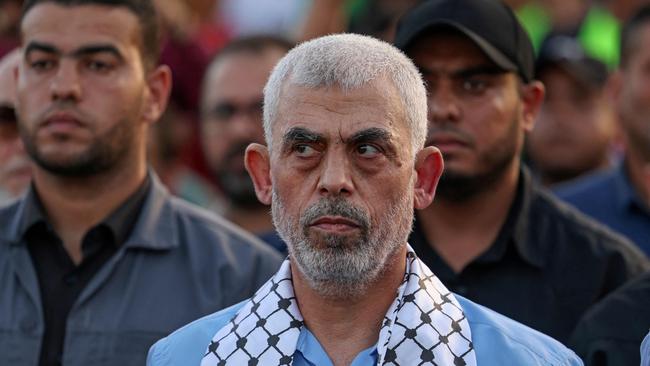Israel closing in on Hamas’ chief lair, half of terror leaders killed
Israel says it has killed about half of Hamas’s mid-level commanders and is pressing on the suspected hiding place of the group’s leader.

Israel said it has killed about half of Hamas’s mid-level commanders in Gaza and is pressing on the suspected hiding place of the group’s leader, deploying a deliberate strategy to disrupt the militants’ ability to fight in the enclave.
Israel has so far failed to assassinate the US-designated terrorist group’s senior leadership, which includes Yahya Sinwar, leader of Hamas in Gaza, and Mohammed Deif, head of the group’s armed wing. But fighting is now coalescing around Khan Younis, one of Hamas’s strongholds in the southern strip, where the Israeli military says Sinwar and others could be hunkered down.
Israeli Prime Minister Benjamin Netanyahu said that his troops had surrounded Sinwar’s house in Khan Younis. The move is largely viewed as symbolic as the Israeli military assesses if the Hamas militant is hiding underground in the group’s tunnel network. But it proves “our forces can reach anywhere in the Gaza Strip”, Mr Netanyahu said.
The structure of Hamas’s secretive armed wing, the Izz ad-Din al-Qassam Brigades, isn’t widely known. But Israel estimates that it has roughly 24 battalions each with 1000 or more fighters. The Israeli military, which on Wednesday engaged in intense fighting in the north and south of Gaza, has said it has significantly degraded at least 10 of those by taking out mid-level commanders Late on Tuesday, Israel’s military said it killed senior commanders hiding in a tunnel in northern Gaza, frustrating the group’s ability to direct operations in that part of the strip.
Israeli forces also released a photo of what they said was a group of operatives who led battalions and brigades, likely overseeing thousands of Hamas fighters. The military said it had found the photo during fighting and highlighted those in the picture whom it claims to have killed, including the commander of the northern brigade in Gaza, although it didn’t say when the people died. Hamas said late last month that Ahmed al-Ghandour, the head of its northern brigade, had died.
Israeli military spokesman Daniel Hagari said on Wednesday that the military had broken through Hamas’ defensive lines.
“The terrorists are now emerging from the underground tunnels and engaging our forces in close combat. Our forces will continue to further our achievements in Jabalya, Shuja’iyya, and also in the Khan Younis area – the heart of Hamas’ terror,” he said.
Israeli military analysts question the extent of the role of Deif, who is believed to have been rendered disabled by repeated assassination attempts. But Sinwar has been involved in negotiating for the hostages with Israel and military analysts believe Qassam’s deputy leader, Marwan Issa, a Gazan in his late 50s, is still in operation.
“The leadership at the mid-level is in a very bad situation,” said Yaakov Amidror, a former national security adviser to Mr Netanyahu. But, he said, the Hamas system hasn’t collapsed yet. “They are still making decisions, they are still fighting.”
Illustrating the ability of Hamas’s leadership to continue operations: Rockets fired from Gaza have increased. Israeli airstrikes have also intensified since the end of a ceasefire. Israel says it has killed up to 5000 fighters out of a total of 30,000 in Hamas’s armed wing, although those figures are only estimates.
Killing Hamas commanders will hurt the group’s ability to fight but it won’t necessarily defeat them, as other fighters will take their place, according to Jack Watling, a senior research fellow at the Royal United Services Institute, a London-based think tank.
Targeting commanders is “very important for two reasons: You degrade a force’s ability to execute more complex operations … and you also remove experienced personnel,” he said.
Israeli forces are engaging in street-to-street combat into the militants’ stronghold of Khan Younis, the biggest city in the southern part of the strip, where Sinwar grew up and which is considered a main hub for Hamas, as fighting has shifted south. The battle for the city of over 400,000 could prove decisive in isolating pockets of Hamas fighters outside their main command-and-control centres. A video from Khan Younis taken on Wednesday showed destroyed buildings with gunfire in the background.
Israel’s stated goal of eradicating Hamas could prove difficult because as well as being a militant group, it is a political movement followed by Palestinians, said Hugh Lovatt, a senior policy fellow with the European Council on Foreign Relations. But the deaths of its leadership would give Israel a public-relations boost that could help create the conditions to end the war, he added.
“Being able to point to the elimination of Mohammed Deif or Yahya Sinwar would give the Israeli government a lot of capital that could allow it to then claim that its military objectives have been accomplished,” he said.
The next stage of the fight threatens to push tens of thousands of civilians toward Rafah, near the Egyptian border, where families are sleeping in tents and parks, and food and water are scarce. Around 70 per cent of Gaza’s population of 2.2 million is in the southern part of the strip, according to the Palestinian Red Crescent. That includes the hundreds of thousands of people who fled the northern part of the enclave in recent weeks at the direction of the Israeli military.
Egypt has reinforced security cordons around its border with Gaza, while tents have been set up in the cities of Sheikh Zuwayed and Rafah to prepare for the likely inflow of refugees. It has also closed off the port city of Al Arish, roughly one hour’s drive west of Rafah that has become a collection point for humanitarian supplies for Gaza, Egyptian officials said.
The likely flood of refugees comes as Egypt’s economy struggles with surging food prices, a depreciating currency and criticism of President Abdel Fattah Al Sisi ahead of an election on December 10. Gulf states have floated the idea of providing financial aid to Cairo in return for accepting Palestinian refugees, Egyptian officials said.
Mr Sisi has warned against a potential refugee crisis within the country’s border that would pose security threats, raising the possibility that more extreme groups than Hamas would enter the Sinai Peninsula.
Health authorities in the Hamas-run territory say that since the end of the ceasefire and resumption of fighting on Dec. 1, at least 1,207 Palestinians have died in the enclave. In total, more than 15,900 people have been killed in Gaza since the war began, most of them women and children, according to the health authorities. The figures don’t distinguish between militants and civilians.
United Nations Emergency Relief Coordinator Martin Griffiths said Tuesday that nowhere is safe in Gaza. “Such blatant disregard for basic humanity must stop. The fighting must stop,” he said.
The Israeli military’s humanitarian unit said Wednesday that it had facilitated the opening of a new route for aid after parts of the strip’s main road around Khan Younis were closed because of fighting.
On Wednesday, United Nations Secretary-General António Guterres took the rare step of formally warning the international body that the war in Gaza now poses a wider threat to global security and stability.
In a letter to the Security Council, Guterres invoked an article of the U.N. Charter, one that U.N. officials said hasn’t been used for decades, to call for a ceasefire.
“The situation is fast deteriorating into a catastrophe with potentially irreversible implications for Palestinians as a whole and for peace and security in the region,” he wrote. “Such an outcome must be avoided at all cost.” The appeal drew a blistering response from Gilad Erdan, Israel’s ambassador to the U.N., who called the letter a “new moral low” for Guterres.
In another sign of the deterioration of already strained ties between Israel and the U.N., Israeli Foreign Minister Eli Cohen said he had revoked the visa of the agency’s top humanitarian co-ordinator for the Palestinian territories, Lynn Hastings. Hastings criticised Israel and failed to condemn Hamas for its Oct. 7 attacks that sparked the war, Cohen said on X, formerly known as Twitter. Hastings didn’t immediately respond to a request for comment.
Hamas and other Palestinian militant groups hold more than 100 hostages taken from Israel in attacks on Oct. 7 that Israeli authorities say killed 1,200 people. Family members of those still held as well as those freed last month met on Tuesday with Netanyahu and his war cabinet to press them to focus on returning the remaining captives.
“The meeting was very tense,” said one family member who took part. She said that four to five freed hostages testified to the war cabinet about what they had experienced in captivity, including sexual assault. She said that families worry about the ability of those remaining to survive under the difficult conditions of captivity in Gaza.
Netanyahu and his ministers spoke in the meeting, but it was clear that they believed the fighting against Hamas must continue to pressure the group to make concessions, she added.
“We succeeded in returning home 110 hostages by a combination of a ground incursion of unprecedented strength and a continuous diplomatic effort,” Netanyahu said Tuesday. “This is the only way to also return the hostages who are still in Hamas captivity, and we are committed to doing so.” The risk of a broader conflict involving Lebanese militant group Hezbollah and other Iran-backed proxies still looms. On Wednesday, the Israeli military said it exchanged fire on its northern border from Lebanon and had intercepted a surface-to-air-missile toward Israel in the south near Eilat.
The Wall Street Journal



To join the conversation, please log in. Don't have an account? Register
Join the conversation, you are commenting as Logout